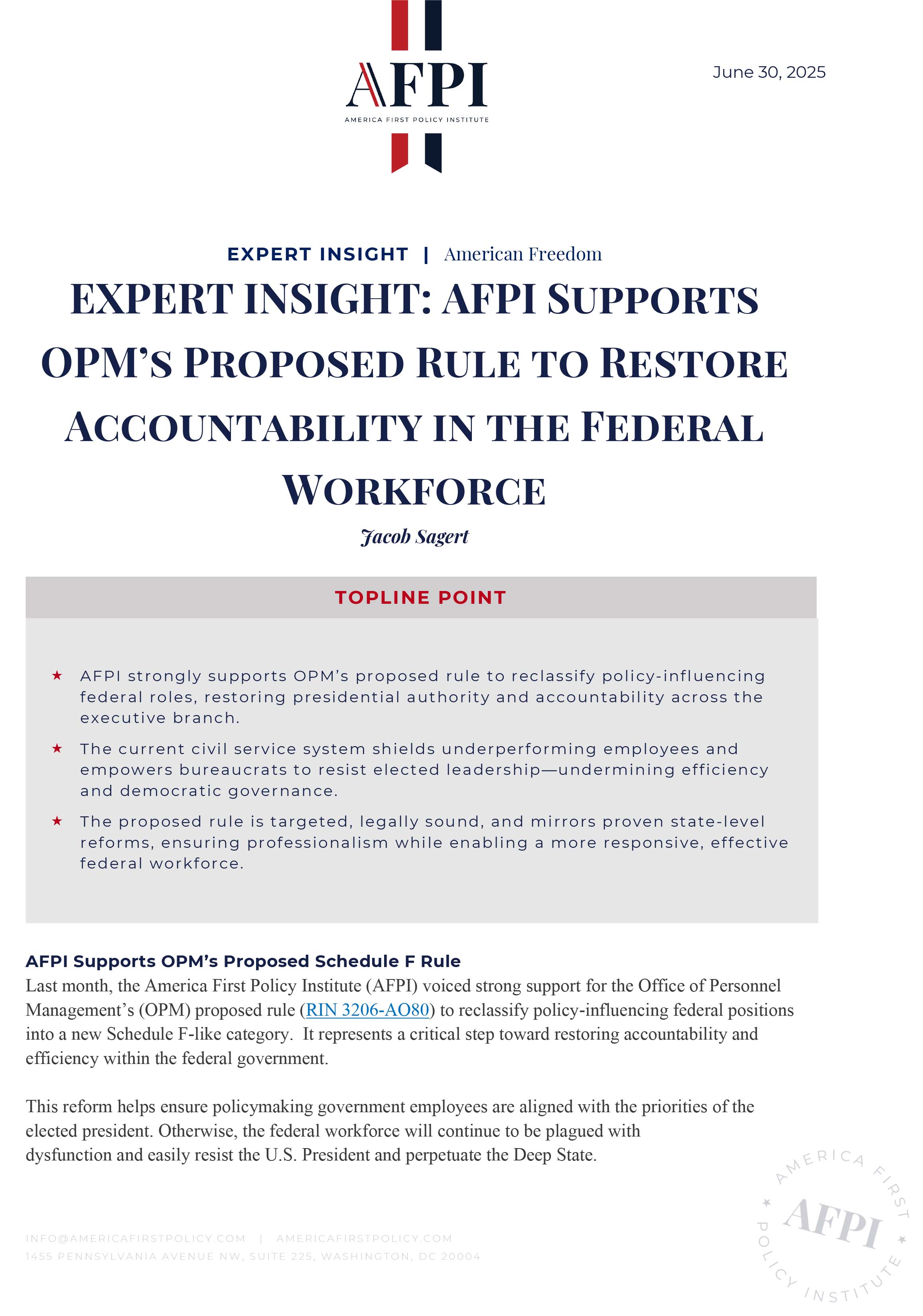AFPI Supports OPM’s Proposed Rule to Restore Accountability in the Federal Workforce
Key Takeaways
AFPI strongly supports OPM’s proposed rule to reclassify policy-influencing federal roles, restoring presidential authority and accountability across the executive branch.
The current civil service system shields underperforming employees and empowers bureaucrats to resist elected leadership—undermining efficiency and democratic governance.
The proposed rule is targeted, legally sound, and mirrors proven state-level reforms, ensuring professionalism while enabling a more responsive, effective federal workforce.
AFPI Supports OPM’s Proposed Schedule F Rule
Last month, the America First Policy Institute (AFPI) voiced strong support for the Office of Personnel Management’s (OPM) proposed rule (RIN 3206-AO80) to reclassify policy-influencing federal positions into a new Schedule F-like category. It represents a critical step toward restoring accountability and efficiency within the federal government.
This reform helps ensure policymaking government employees are aligned with the priorities of the elected president. Otherwise, the federal workforce will continue to be plagued with dysfunction and easily resist the U.S. President and perpetuate the Deep State.
Challenges in Addressing Poor Performance
Federal agencies face significant challenges in managing poor performance and civil service procedures make it extraordinarily difficult to remove underperforming employees. Surveys show only 28–42% of federal workers believe their agencies effectively address performance issues. Further, only 40% of supervisors expressed confidence in their ability to remove employees for serious misconduct, and a mere 25% felt confident they could remove an employee who failed a Performance Improvement Plan (PIP). In fiscal year 2022, only 0.24% of tenured federal employees were removed for misconduct or poor performance—a low figure that highlights systemic inefficiency.
Resistance to Presidential Authority
Equally troubling is the resistance within the bureaucracy toward implementing presidential directives. Career employees in policy-sensitive roles have, at times, deliberately delayed action, withheld information, or directly defied instructions. This undermines the executive branch’s ability to carry out the will of the people and weakens democratic accountability.
Judicial Overreach in Executive Operations
Courts increasingly block lawful efforts by the executive branch to reorganize agencies, reduce workforce redundancies, and manage internal operations, creating barriers to effective governance.
Why the Proposed Rule Is Necessary
The proposed rule is both necessary and legally justified. It would make policy-influencing roles at-will positions, restoring the President’s ability to ensure that those executing federal policy are doing so in accordance with the administration’s priorities. It would also streamline personnel processes to improve agency efficiency and responsiveness.
The proposed rule explicitly prohibits discrimination based on political affiliation and mirrors successful state-level reforms that have preserved professionalism and merit-based hiring practices. The proposed rule is targeted, well-founded and balances due process with the need for flexibility in policy-sensitive roles. AFPI urges OPM to finalize and adopt this rule to ensure a more responsive and effective civil service for the American people.
Public Comment Submitted by AFPI Experts
The public comment prepared by Senior Policy Analyst Jacob Sagert of AFPI’s Center for American Freedom and Associate Attorney Nicholas Wanic with the Center for Litigation can be found here.
